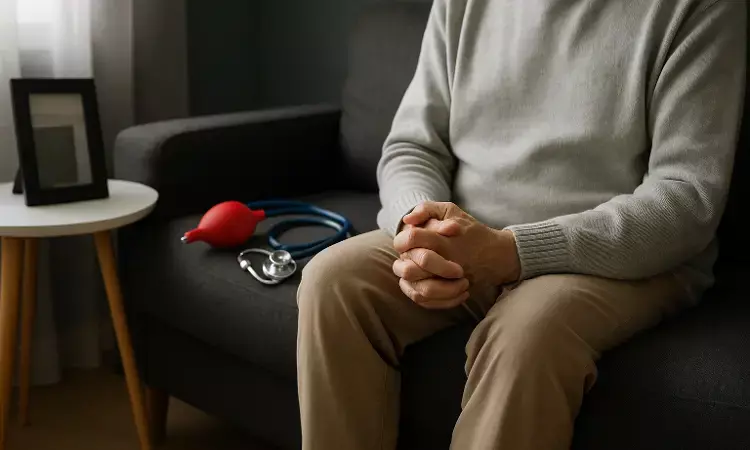- Home
- Medical news & Guidelines
- Anesthesiology
- Cardiology and CTVS
- Critical Care
- Dentistry
- Dermatology
- Diabetes and Endocrinology
- ENT
- Gastroenterology
- Medicine
- Nephrology
- Neurology
- Obstretics-Gynaecology
- Oncology
- Ophthalmology
- Orthopaedics
- Pediatrics-Neonatology
- Psychiatry
- Pulmonology
- Radiology
- Surgery
- Urology
- Laboratory Medicine
- Diet
- Nursing
- Paramedical
- Physiotherapy
- Health news
- Fact Check
- Bone Health Fact Check
- Brain Health Fact Check
- Cancer Related Fact Check
- Child Care Fact Check
- Dental and oral health fact check
- Diabetes and metabolic health fact check
- Diet and Nutrition Fact Check
- Eye and ENT Care Fact Check
- Fitness fact check
- Gut health fact check
- Heart health fact check
- Kidney health fact check
- Medical education fact check
- Men's health fact check
- Respiratory fact check
- Skin and hair care fact check
- Vaccine and Immunization fact check
- Women's health fact check
- AYUSH
- State News
- Andaman and Nicobar Islands
- Andhra Pradesh
- Arunachal Pradesh
- Assam
- Bihar
- Chandigarh
- Chattisgarh
- Dadra and Nagar Haveli
- Daman and Diu
- Delhi
- Goa
- Gujarat
- Haryana
- Himachal Pradesh
- Jammu & Kashmir
- Jharkhand
- Karnataka
- Kerala
- Ladakh
- Lakshadweep
- Madhya Pradesh
- Maharashtra
- Manipur
- Meghalaya
- Mizoram
- Nagaland
- Odisha
- Puducherry
- Punjab
- Rajasthan
- Sikkim
- Tamil Nadu
- Telangana
- Tripura
- Uttar Pradesh
- Uttrakhand
- West Bengal
- Medical Education
- Industry
Less Social Isolation Linked to Better Self-Care in Heart Failure Patients: Study

Patients with heart failure (HF) who are less socially isolated demonstrate significantly better self-care behaviors, according to a new study, while loneliness alone appears to have no measurable impact on self-care engagement.
The study, published in the Journal of Cardiovascular Nursing by Wolters Kluwer Health is a secondary analysis of the GEtting iNTo Light Exercise for HF randomized controlled trial, the cross-sectional study evaluated 49 patients with HF participating in a 6-month, home-based group exercise intervention. The research aimed to assess whether social isolation or loneliness could predict adherence to four domains of HF self-care: maintenance, monitoring, management, and confidence.
Validated tools were used to assess each domain:
- The 6-item Lubben Social Network Scale measured social isolation,
- The PROMIS Social Isolation survey assessed loneliness,
- HF self-care was evaluated using the Self-Care of Heart Failure Index, and
- Depression was measured via the PROMIS Depression survey.
After adjusting for depression and intervention grouping, lower social isolation scores significantly predicted better self-care in three key areas:
- Maintenance (B = 0.937, P = .015),
- Monitoring (B = 0.799, P = .041),
- Management (B = 1.812, P < .001).
However, loneliness did not predict self-care in any domain.
This study is notable for being the first to distinctly examine social isolation and loneliness as separate predictors of HF self-care, rather than treating them interchangeably. Researchers emphasized that interventions aimed at enhancing social connectedness—such as strengthening personal networks or structured group activities—may be critical to improving self-care behaviors in patients with HF.
“These findings underscore the need for clinicians to assess social support structures, not just emotional well-being, when designing heart failure care plans,” the authors noted.
Further prospective studies are warranted to determine whether reducing social isolation can lead to improved clinical outcomes, such as decreased hospital readmissions and mortality in the HF population.
Reference: Platz K, Cavanagh CE, Metzger M, Park LG, Howie-Esquivel J. Effects of Social Isolation and Loneliness on Heart Failure Self-care: A Cross-sectional Analysis. J Cardiovasc Nurs. 2025;40(3):218–227. Published by Wolters Kluwer Health. Available via Ovid®. DOI: 10.1097/JCN.0000000000001123.
Meghna A Singhania is the founder and Editor-in-Chief at Medical Dialogues. An Economics graduate from Delhi University and a post graduate from London School of Economics and Political Science, her key research interest lies in health economics, and policy making in health and medical sector in the country. She is a member of the Association of Healthcare Journalists. She can be contacted at meghna@medicaldialogues.in. Contact no. 011-43720751


